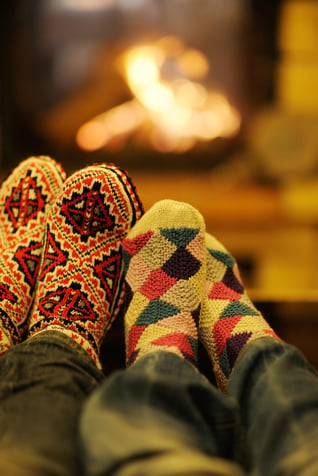Bookworms, mildew, water. These are the most common culprits of rare book damage. But if you've invested in your personal library, you'll also want to prepare for a more serious threat: fire. Though fires are certainly more rare than other destructive forces, they can cause far more damage.
Where There's Smoke...
 The flames themselves are not the only threat to your rare book collection: smoke can wreak havoc as well. The wet smoke from a smoldering fire can leave behind a sticky residue and cause warping. Higher temperature fires that burn fast produce a dry smoke that is especially harmful to antiquarian books and documents. And your books can incur fire-related damage simply by being exposed to the soot puffed out by a furnace or other heating source.
The flames themselves are not the only threat to your rare book collection: smoke can wreak havoc as well. The wet smoke from a smoldering fire can leave behind a sticky residue and cause warping. Higher temperature fires that burn fast produce a dry smoke that is especially harmful to antiquarian books and documents. And your books can incur fire-related damage simply by being exposed to the soot puffed out by a furnace or other heating source.
The extent of smoke damage on rare books depends on both the source of the smoke and the condition of the books themselves. Damage may include stains, odor, and warping, usually to exposed surfaces. Pages may also become more brittle, and bindings might be destroyed. Smoked-damaged books are more susceptible to "fingerprint damage," so don't touch the individual pages.
As always, the quality of the book will impact how prone to damage it is. For example, the cheaper paper frequently used in the 1800s and mid-1900s has a higher acid content and is more likely to incur smoke damage than paper that uses more cotton fiber and wood pulp.
The good news is that shelving books in the usual way can actually protect your books from smoke damage. If your books and documents are properly stacked, they will protect each other, and damage will occur only on the covers and paper edges. Heavy archival bags will also prevent smoke exposure. Though there are DIY remedies for odor in rare books, you'll want to consult an expert if your rare books are warped, cracked, or brittle or if the binding has been compromised in any way.
...There's Fire
Fire is clearly the enemy of any item made of paper. Unlike smoke, flames can cause irreparable harm to your personal library. While it's impractical to keep all your rare books in fireproof containers, you can take measures to protect them from open flames. Those plastic covers that we use to prevent sunning? Surprise! They're also flame retardant because they burn at a much higher temperature than paper. In the event of a fire, plastic covers can also protect your books from falling victim to some of the smoky smell.
You'll also want to install a smoke detector in your personal library and keep a fire extinguisher close by. Preventing damage is key—restoring rare books after fire damage is often impossible.
If books are exposed to open flames, you'll need to consult an experienced conservator about restoration and preservation. Once paper has been burned, it's incredibly fragile. The conservator will carefully examine your book to determine the best course of action. In many cases, the best course of action is simply preservation, that is, preventing the document from further damage. The conservator may choose to support individual pages of a burned document with a handling folder (usually made of white tissue), a heavier folder for support, and an outer box. All these materials should be made of high quality acid-free paper.
Sometimes paper that looks like it's been burnt beyond the point of legibility needs only to be lit differently or digitally enhanced using a program like Adobe Photoshop. If the document's contents are important, they can then be transcribed. You can keep a copy of the transcription with the document for future reference. In cases of less serious burning, such as singeing around page edges, the conservator may be able to repair the book completely.









